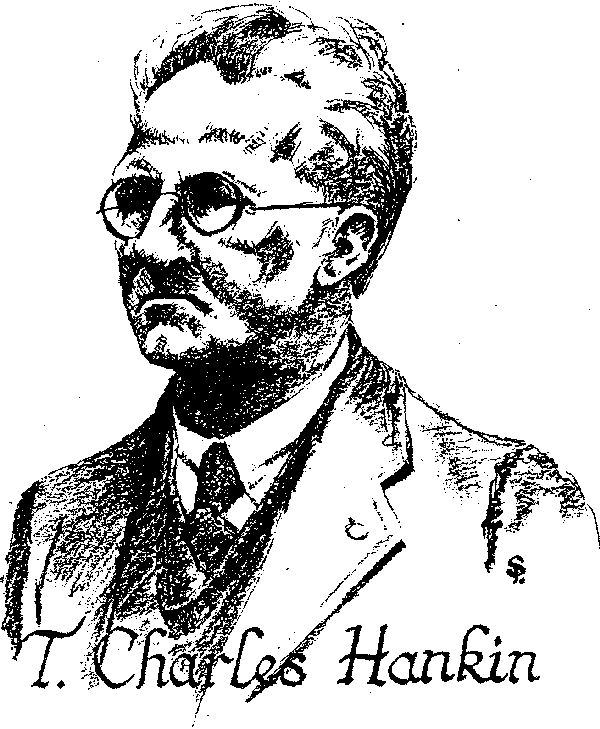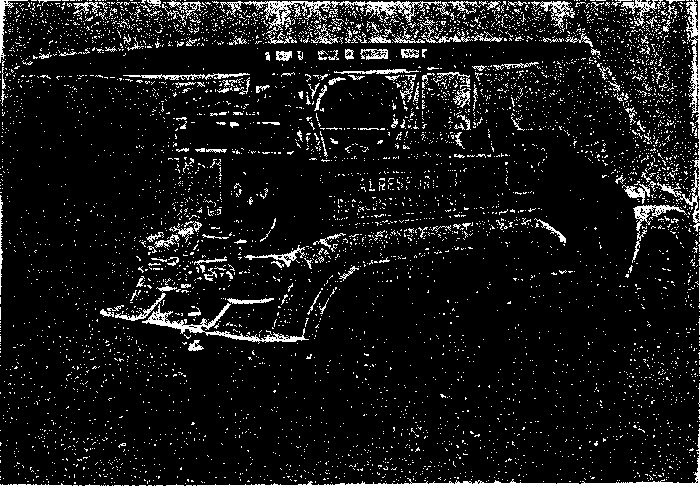THOMAS CHARLES HANKIN
By
Alex Hankin

When I was asked to write an article about my father, Thomas Charles Hankin, I began to realise that I knew little of him and that which I did know was by hearsay. I also began to understand what a very great impact he made upon Alresford and townsfolk in such a comparatively short time. He died in January 1933 having only come to live in Alresford in 1906. When he died I was 13 years old.
Charlie Hankin, as he was known, his father was Thomas Hankin, was born in London in 1881, was educated at Westminster School and started work apprenticed to Harvey Nicols, Silk Merchants, in the City of, London. His address in 1900 was 50 St Pauls Church Yard, so he certainly was a true Londoner. At the time of his leaving London he was working for Harrods.
His early interests were very much connected with the Church, the Boys Brigade and music. Undoubtedly he was a worker in all three and in 1904 was presented with a watch from the Rockland Musical Society, 'For Services Rendered'.
His father was the Landlord of The Swan Hotel in Alresford and when he died in 1906' Charlie was asked by his widowed mother to come home and help. He soon found that the Hotel business was not his interest and he encouraged his mother to buy a car to act as an Hotel 'courtesy car', from the station to the hotel, and from the hotel to the villages around, after the Clients had wined and dined. This was done and he was trained to maintain the Argyll car by a Mr. Taylor in Winchester. He soon started to maintain the very few cars around and advise the owners in Alresford and the neighbouring villages. So started the firm of Hankins.
Outside of his business interests his community interest started. In the Church he found scope for music, where he played the organ and the piano. His sister was the church organist and he sang in the choir for the rest of his life. He was also a member of the Parochial Church Council. In the early days he became a member of the Volunteer Fire Brigade and in 1910 became a Parish Councillor, two years later a Town Trustee. He was a natural leader in all these spheres. He became Chief Officer of the Fire Brigade, and Chairman of the Parish. Council in the early 1920's. In 1924 he became a member of the Alresford Rural District Council.
His musical interests went beyond the church into the local Musical Societies, Alresford Choral Society (Harry Hall of Cranley, Broad Street) and Ovington (Mrs. Hoares' Society).Then there was general entertaining, no television nor much radio in those days, so his strong bass voice was in demand in the villages around, in what we would now refer to as Charity Concerts. The Alresford Choral Society put on several Gilbert & Sullivan productions in the Town Hall, and on one occasion, the Dogs of Devon in the grounds of Langtons. The Church also produced a series of Missionary Pageants in the Rectory grounds (Sun Lane); in one he was St. Paulinus, Bishop of York, and in another a Black Chieftain. In most of this he took lead bass and was very much part of the organisation.
In both the Parish and Rural District
Councils he took a very active interest
working on many of the committees.
He was a great protector of the rate
and the effects that an increased rate
would have on the businesses of the
town. His attitude was that if the
businesses failed the town itself could
not survive.
An interesting series of cross responsibilities
arose in respect of his role as Chief
Fire Officer and his membership of
the Parish Council. In 1920 they were
the authority responsible for the Fire
Service. In 1921 the District Council
took over the Service. We see him on
November 1920 writing to the Parish
Council, of which he was a member,
saying : 'Owing to the delay in the
negotiations with the A.R.D.C. the
members of the Brigade are unable to
take further responsibility with regard
to the fire appliances, neither can
they any longer take the responsibility
for life or property due to the inefficiency
of the Brigade'. The first Fire Service
strike? In February 1921 the take over
took place and his position as Chief
Officer was confirmed by the new authority.
In January 1923 he resigned as he was to stand as a District Councillor and his Second Officer Mr. Smith was appointed chief. However as a result of a petition from the members of the Fire Brigade he was reappointed as Chief, but as a volunteer rather than retained. He did in fact not become a member of the District Council until the following year when his position was confirmed as Honorary Chief Officer.
In the Fire Brigade he was responsible for the change from the era of the horse drawn steam pump to the motor fire engine. In the first war there was a shortage of horses and the steam fire engine was some times drawn by a motor van from one of the businesses in the town. After the first war a second hand motor chassis was purchased and converted into a towing vehicle, this being replaced in the late twenties by a "proper" fire engine.
The stories told of the fires of that time are numerous. The day when the horses were not to hand and the pump was hauled by the firemen to a fire at Old Alresford was but one.
Charlie having come from London where skating on the ponds in winter was great entertainment, was delighted when Old Alresford Pond, larger than it is now, was frozen over. He was enthusiastic to get everyone skating and the ice soon became somewhat cut up. My father's answer; get the fire engine and put a fresh layer of water on top of the ice. Father and his men set to work in the evening, but the firemen on skates were not on them for long as the force of the hoses knocked them over. The results made the town laugh but nothing else was achieved.

Morris-Commercial Fire Engine
Courtesy - Alresford Fire Brigade
His mother retired from The Swan Hotel and in 1913 he purchased the Garage premises in West Street, what is now the forecourt and showroom. It then consisted of a workshop mainly for the repair of traction engines and probably farm machinery. On the west side was a cottage which was altered to become the offices. The business was open for the sale, repair and hire of cars and the sale of petroleum spirit. The latter came in cans by rail from Hamble and the cans were marked "Hankins No.1 Spirit". It was not until 1924 that hand operated pumps were installed, although by then the cans were being marketed by the major petroleum companies who delivered them by lorry.
The 1914 war started and the workshop was turned over to the manufacture of shell caps. The lathes and other machines were driven by a large single cylinder engine powered by town gas. This also at some time drove a generator to produce electric lighting. The staff was entirely female except my father and one other man. My father was unfit for active service, but enrolled as a local volunteer and carried out some recruiting responsibilities.
In 1915 he married my mother Jane Bailey and they started their married life at Glenroy in Grange Road, where I was born. During the decade after the war he expanded and developed the business with a small workshop and petrol pump at the Anchor Inn in Ropley, and a petrol and service unit at the West Meon Hut. He had the high hedge cut down at that, even then, dangerous corner and installed petrol pumps with a manager living in the cottage. The object was to carry out running repairs in these villages and feed the major repairs back to the West Street garage. He opened dealerships for Morris and Standard cars but at various times also held an Austin and Ford Agency.
Within the larger sphere of the Motor Industry, he became a Fellow of the Institute of the Motor Trade. With his ever increasing interest in the development of the retail industry he became Chairman of the Bournemouth and District Branch of the Motor Traders Association and Chairman of the Hants and District Division of the Motor Agents Association, and then two additional associations covering the whole of the expanding garage business.
He purchased an existing business in Alresford in Station Road, the site where Alders Court has now been built. This was never fully operational and with hindsight was a case of overdevelopment.
A man of interest in all things mechanical and electrical he started on the corner of West Street and Station Road a motorcycle and bicycle business, which also turned into the first wireless shop in the town. As an employer and businessman he was extremely popular with both his staff and also his clients. I think he was a man before his time, with great foresight, but expanded too rapidly and most of these outer businesses had to be disposed of at the time of his early death, to enable his executors to retain the original business.
With all of these interests he still had time for his family. My mother entertained at Glenroy and we always had uncles, aunts and cousins to stay, with a great deal of home entertainment, usually around the piano, and also with the new-fangled wireless which hung on three shelves from the picture rail with its gleaming valves and knobs to turn the coils. A loud speaker was mounted in the front of the house for the people of Grange Road to hear the King broadcast, opening public broadcasting, I think, in about 1924.
Summer entertainment was tennis parties in the garden or trips to the seaside at Lee-on-Solent after church on Sunday. For these trips at one time we had a sort of Ford Shooting brake, so frequently we took local friends with us.
Father was always made by my mother and his mother to take two weeks summer holiday, usually spent on the east coast as it was bracing. He also always took a cold bath every morning until he was fifty, all these to keep him fit and active, but to no avail.
In mid-1932 he moved from Grange Road to the Alders, West Street modernised the house and even had it connected to the works electric light system. There were no mains electric in Alresford until 1937/8. He could now work at home and be near his family whilst at work, but it was not to last. In January 1933 he contracted pneumonia and died.
One can only realise what an impact his short life had upon the town and people of Alresford by looking at the photographs of his funeral, showing the town closed and the people lining the streets as the coffin was borne to the church on the fire engine. The obituaries and reporting of the funeral in the local papers indicated the vast scope of his interests and the affection and respect that he held in the very many organizations and friendships he had formed between 1906 and 1933.
Copyright Alex Hankin November 1990